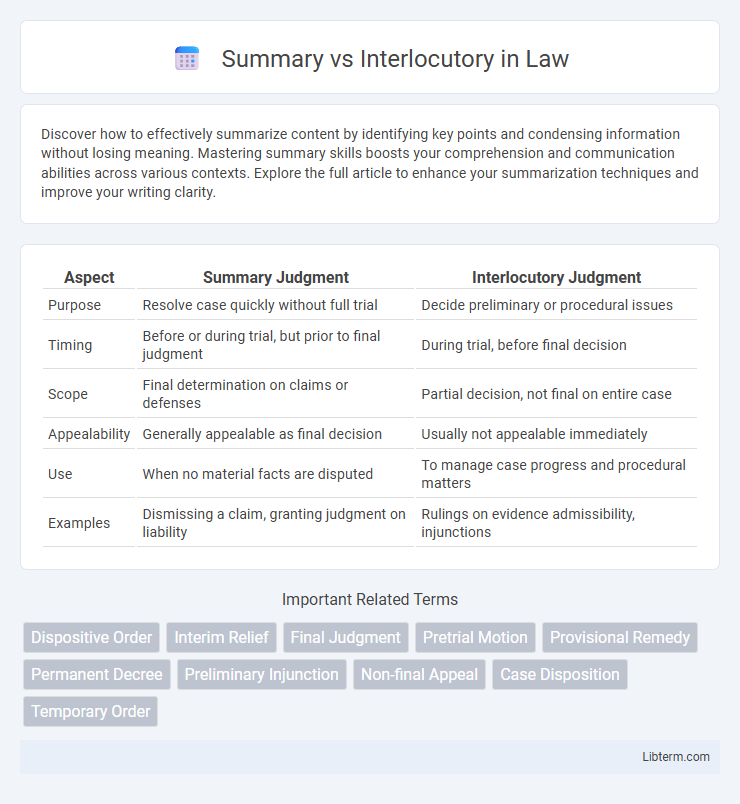Discover how to effectively summarize content by identifying key points and condensing information without losing meaning. Mastering summary skills boosts your comprehension and communication abilities across various contexts. Explore the full article to enhance your summarization techniques and improve your writing clarity.
Table of Comparison
| Aspect | Summary Judgment | Interlocutory Judgment |
|---|---|---|
| Purpose | Resolve case quickly without full trial | Decide preliminary or procedural issues |
| Timing | Before or during trial, but prior to final judgment | During trial, before final decision |
| Scope | Final determination on claims or defenses | Partial decision, not final on entire case |
| Appealability | Generally appealable as final decision | Usually not appealable immediately |
| Use | When no material facts are disputed | To manage case progress and procedural matters |
| Examples | Dismissing a claim, granting judgment on liability | Rulings on evidence admissibility, injunctions |
Understanding Summary Orders
Summary orders are final judgments rendered without a full trial, typically issued when the facts are undisputed and one party is entitled to judgment as a matter of law. Interlocutory orders, by contrast, are provisional rulings made during the course of litigation that resolve preliminary or procedural issues but do not determine the ultimate rights of the parties. Understanding summary orders involves recognizing their binding effect and the limited scope for appeal compared to interlocutory orders, which usually require further proceedings before final resolution.
Defining Interlocutory Orders
Interlocutory orders are judicial rulings made during the course of litigation that address procedural or substantive issues without determining the final outcome of the case. These orders often resolve matters such as injunctions, discovery disputes, or temporary relief, maintaining the status quo until a final judgment is reached. Unlike summary judgments, which conclude claims based on the evidence, interlocutory orders are typically non-final and subject to revision or appeal under specific legal standards.
Key Differences Between Summary and Interlocutory
Summary judgments resolve cases without a full trial by assessing whether there are genuine disputes of material fact, providing a swift conclusion based on evidence presented in pleadings and affidavits. Interlocutory orders are temporary or provisional rulings made during the course of litigation to address procedural or evidentiary issues without determining the final outcome of the case. The key difference lies in their purpose: summary judgments aim to dispose of the entire case or specific claims, while interlocutory orders manage ongoing procedural matters within the case.
Legal Implications of Summary Orders
Summary orders, often issued without a full trial, expedite legal proceedings by resolving clear-cut cases where facts are undisputed, minimizing court resources and costs. These orders carry significant legal implications as they are typically final and binding, limiting opportunities for appeal compared to interlocutory orders, which are provisional and address procedural or interim matters during ongoing litigation. Understanding the distinction aids in strategic litigation planning, ensuring parties recognize when immediate resolution is possible versus when issues require further judicial examination.
Purposes of Interlocutory Orders
Interlocutory orders serve the purpose of addressing immediate, procedural, or interim matters that arise during the course of litigation, ensuring the smooth progress of a case without determining its final outcome. These orders are designed to preserve the rights of the parties, prevent irreparable harm, and manage issues such as injunctions, discovery disputes, or temporary relief. Unlike summary orders, interlocutory orders facilitate timely judicial intervention on critical but non-final issues, streamlining the litigation process while awaiting the resolution of main claims.
When Are Summary Orders Issued?
Summary orders are issued when a court resolves a case or specific claims without a full trial, typically because the material facts are undisputed and the law clearly favors one party. These orders expedite the legal process by providing a final or partial judgment based on the pleadings, affidavits, or other evidence, eliminating the need for lengthy litigation. Interlocutory orders, in contrast, are temporary rulings made during the course of litigation to address procedural or ancillary matters without deciding the entire case.
Examples of Interlocutory Applications
Interlocutory applications include motions for temporary injunctions, applications to stay proceedings, and requests for interim maintenance or custody orders. These applications address urgent issues requiring immediate court intervention before the final decision of a case. Examples in civil litigation include motions for attachment before judgment and requests to amend pleadings during trial.
Appealability: Summary vs Interlocutory
Summary judgments are final decisions on the merits of a case, making them generally immediately appealable. Interlocutory orders address preliminary or procedural issues and are typically not appealable until the final judgment. Exceptions to interlocutory appealability exist under specific statutes or when immediate review prevents irreparable harm.
Practical Impacts in Legal Proceedings
Summary judgments streamline legal proceedings by resolving cases without full trials when there is no genuine dispute of material fact, significantly reducing time and costs. Interlocutory orders address procedural or preliminary issues during litigation, impacting the direction and pace of a case but do not determine the final outcome. Efficient use of summary judgments can expedite resolution, whereas interlocutory decisions require careful tactical consideration to avoid prolonging litigation.
Choosing the Right Order for Your Case
Summary orders provide a swift resolution by deciding cases without a full trial, ideal for clear-cut issues where the facts are undisputed. Interlocutory orders address preliminary matters during ongoing litigation, such as motions or procedural questions, allowing parties to resolve specific disputes without waiting for the final judgment. Choosing the right order depends on the complexity and status of your case, with summary orders suited for efficiency and interlocutory orders beneficial for managing critical in-trial decisions.
Summary Infographic

 libterm.com
libterm.com